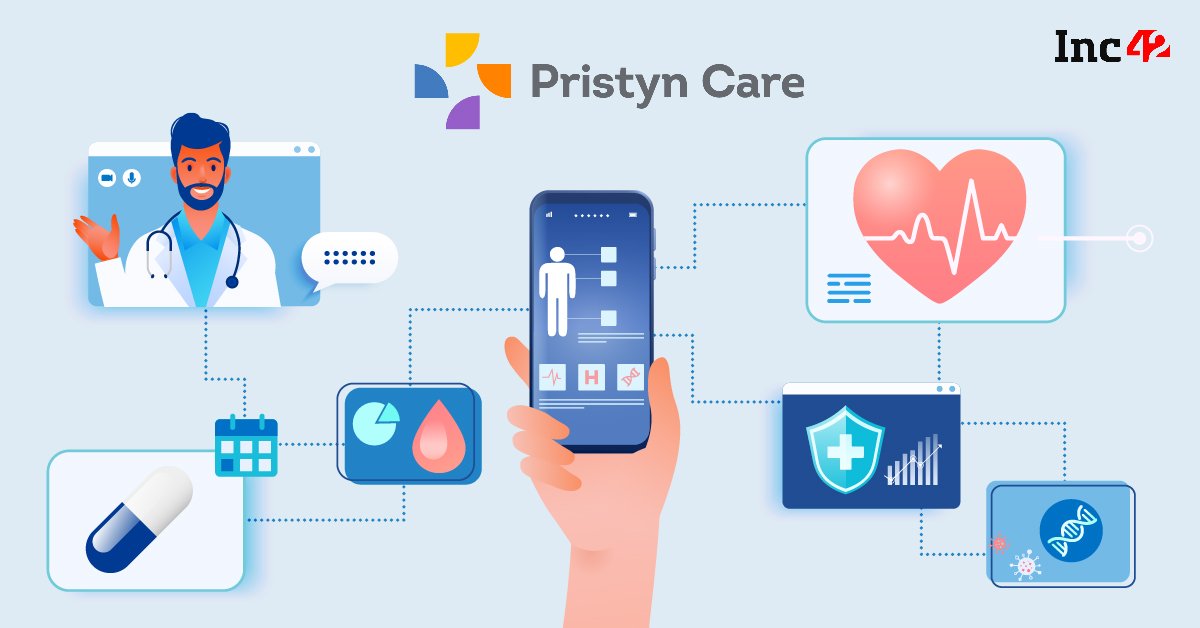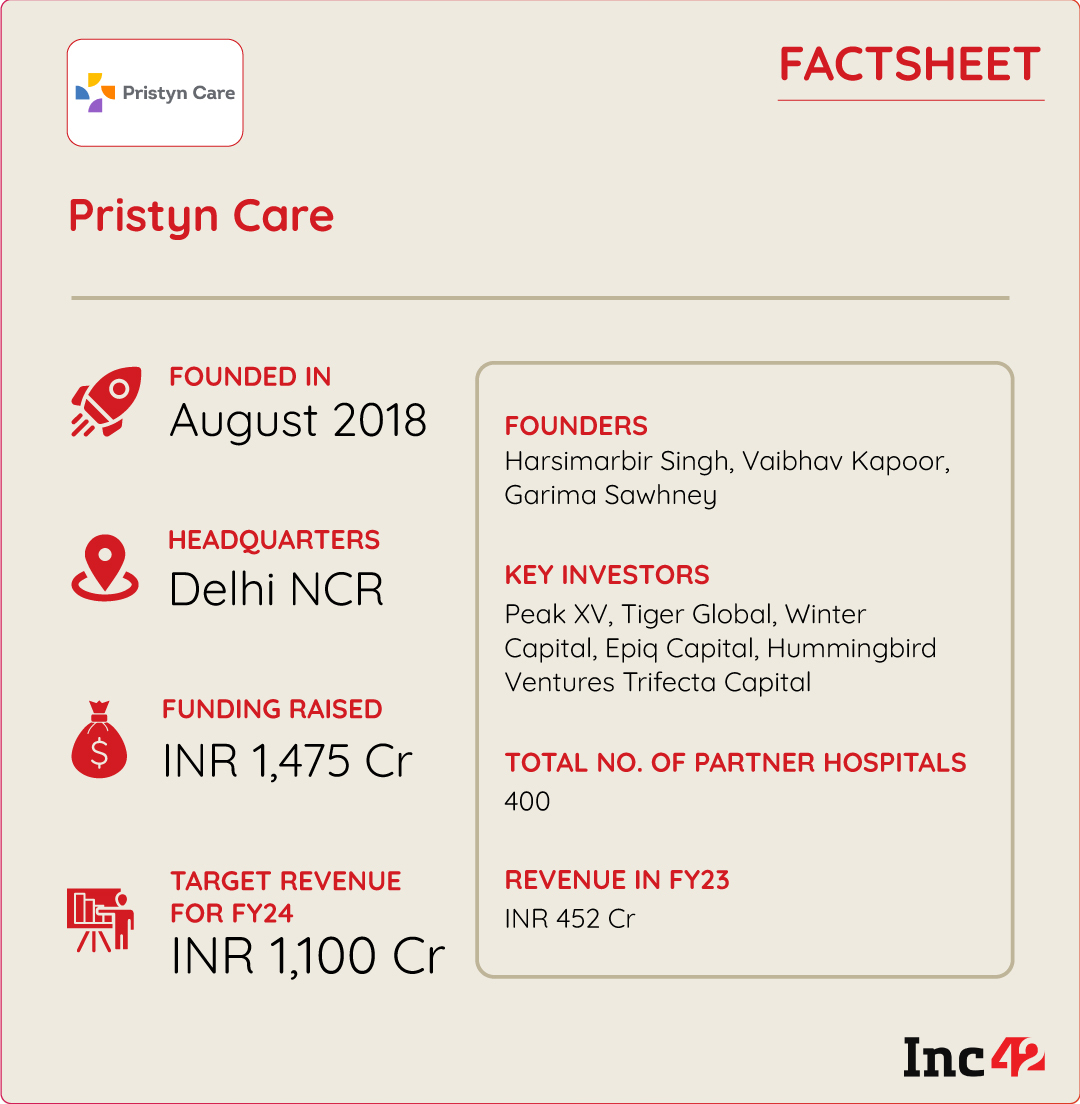Startup Stories
How Pristyn Care Is Democratising Equitable Surgical Healthcare For All Indians

One thing that the Indian healthcare industry is infamous for is the disparity that exists in this space. While we have unlimited access to cutting-edge tech for the rich and state-backed healthcare schemes for the poor, there remains a noticeable gap for individuals belonging to the middle-income bracket.
Moreover, amid the prevailing landscape, only a handful of individuals have access to end-to-end healthcare, a concept largely alien to the Indian mind.
Pristyn Care, a new-age healthcare company, came into existence to bridge the glaring gap that has prevailed in the Indian healthcare space for too long and democratise equitable surgical healthcare in the country.
Founded in 2018, the healthcare startup specialises in simplifying the end-to-end healthcare journey of patients undergoing surgical procedures.
The healthtech startup earned the unicorn tag after raising $96 Mn in a Series E round at a valuation of $1.4 Bn from Peak XV Partners, Tiger Global, Winter Capital, Epiq Capital, et al.
With a focus on making the journey of its patients seamless, Pristyn Care helps them identify the right doctors, schedule appointments, obtain detailed reports, handle insurance paperwork, facilitate transportation to and from the hospital on the day of the surgery, and manage admission-discharge processes and post-surgery follow-up consultations.
The holistic healthcare model deployed by the startup mitigates numerous challenges patients and their family members encounter throughout the healthcare journey.
Pristyn Care’s Inaugural Chapter
The year was 2018, and medical doctors Garima Sawhney and Vaibhav Kapoor, along with now the fourth-time entrepreneur, Harsimarbir Singh, found themselves engulfed in a long conversation concerning the state of healthcare in the country.
From these conversations, the trio realised the significant hurdles in the surgery journeys of patients, especially concerning lower and middle-income individuals. Among other glaring factors were struggles in securing timely clinic appointments, complex insurance paperwork, high costs and inadequate post-surgery commuting arrangements.
Harsimarbir Singh could relate to these experiences very well, as he had been in a similar situation when his mother had to undergo a gynaecological surgery. Harsimarbir’s brush with getting post-operative care and how he went through the hassles of his medical insurance approval isn’t exactly a story worth remembering.
Moving on, as disruptions in the healthcare space stared right into their eyes, the trio pooled all their resources, money, management, talent and time, making way for Pristyn Care in August 2018.
Today, Gurugram-based Pristyn Care offers advanced secondary care surgeries via a network of 700+ hospitals and 150 clinics. It covers more than 50 diseases, including piles, hernia, gallstones, varicose veins, and spine injuries, serving patients in 40+ Indian cities. The startup also offers surgeries across proctology, laparoscopy, gynaecology, ENT, urology, vascular and orthopaedics disciplines.
Pristyn Care In A Snapshot
One of the cofounders of the healthtech startup, Dr Kapoor, told Inc42 that much has gone into making Pristyn Care a healthcare startup that operates with complete transparency and guides patients through their entire treatment journey — from initial consultation to diagnostics, admission, surgery and post-discharge care.
Patients can sign up on the Pristyn Care website and app to book consultations and surgeries and are assigned the coordinator through the website and app. Each patient is assigned a dedicated care coordinator and access to tech support for a seamless healthcare journey.
While customer-facing services are one aspect of the startup’s impact, Pristyn Care also empowers underutilised small and medium hospitals with the latest state-of-the-art medical equipment. It also has a nurse training programme to upskill and train 10K+ nursing and paramedical staff in all its partner hospitals. To date, it has onboarded over 400 skilled surgeons.
Since its inception, the healthtech unicorn has raised nearly $177 Mn in funding from the likes of Peak XV, Tiger Global, Winter Capital, Epiq Capital, Hummingbird Ventures and Trifecta Capital and angel investors like Cred’s Kunal Shah and Zomato’s Deepindar Goyal, et al, as its backers.
With all the investor push, the startup’s revenue is expected to touch INR 1,000 Cr in FY24, a whopping 102% YoY jump from INR 494 Cr in FY23, said Dr Kapoor.
In its latest financials, Pristyn Care reported a 1.4X year-on-year (YoY) increase in revenue to INR 452.8 Cr in FY23 from INR 312.7 Cr in FY22. However, it experienced a 38% surge in net loss to INR 382.5 Cr from INR 277.1 Cr in the same period.

Pristyn Care’s Initial Hiccups
The founders told Inc42 that their vision has been clear ever since they first put their heads together to address the healthcare needs of a common middle-class individual.
“Our focus was clear. We always wanted to revolutionise healthcare for middle and lower-income groups in India. This is because affordable healthcare is not easily accessible to this class. For one, they are not below the poverty line to avail the benefits of government schemes, and, secondly, they are not rich enough to afford hefty hospital bills or even pay for nifty health insurance,” the Harsimarbir said, highlighting the core philosophy of the venture.
Interestingly enough, the government recognises this group as the ‘missing middle’. According to Niti Ayog, 40 Cr individuals, accounting for 30% of India’s population, fall under this category.
Now, with their eyes set on the vision of making advanced elective surgeries accessible to all income groups, the next challenge was to make doctors and small and medium hospitals join their cause.
The hospitals they approached showed little faith in Pristyn Care’s business model, and similar was the response of the doctors outside their social circle, Dr Vaibhav Kapoor recalled.
He added that explaining to doctors that they would be consulting at Pristyn Care clinics but conducting surgeries elsewhere took a lot of work.
Though the doctors were initially unfamiliar with the business model, the founders effectively addressed their concerns. Highlighting the prospect of ditching patient acquisition headaches, they emphasised how the startup’s extensive network and marketing infrastructure would alleviate that burden. Doctors could finally focus on what mattered most – surgeries and patient care. This resonated strongly with doctors, and a powerful word-of-mouth buzz soon bolstered the number of medical partners. To date, 400+ doctors have joined Pristyn Care.
Doctors working full-time with Pristyn Care also receive comprehensive training and have access to the latest surgical equipment and support in publishing their work in national and international medical journals under the Medical excellence programme called PRIME.
Pristyn Care collaborates with mid-sized hospitals, equipping them with state-of-the-art surgical equipment to conduct advanced surgeries. This not only enhances the hospitals’ capabilities but also boosts their utilisation. Additionally, it benefits patients financially as they have to pay 30-40% less in comparison with other hospitals, claims Dr Kapoor.
Pristyn Care operates its own clinics by renting spaces, holding all necessary licenses to provide all healthcare services. Additionally, insurance companies such as Aditya Birla, SBI General, Safeway TPA etc are officially associated with Pristyn Care, reflecting its growing influence and credibility in the healthcare sector, claimed Dr Garima Sawhney.
“We were a bootstrapped startup back in late 2018 and had no investor name associated with us. This posed a challenge. However, Peak XV Partners showed interest in our business model, and the impact we wanted to create in India got us $4 Mn in Series A funding round in 2019,” Dr Kapoor said.
With initial hiccups out of the way and backing from investors, Pristyn Care was able to create a robust network of 700 hospitals and 150+ clinics. The company has a workforce of 1,600 employees, including a tech team of 100 individuals.
“In the last four years, we have trained 10K paramedical and nursing staff in our partner hospitals. Besides, we joined hands with the central government in July 2022 to issue unique identification health cards under the Ayushman Bharat Digital Mission’s (ABDM) scheme called Ayushman Bharat Health Account (ABHA),” Dr Sawhney said.
For context, the scheme aims at providing digital health IDs to all Indians so that health records can be accessed and shared digitally. To do so, it partners with healthcare providers, such as Pristyn Care.
The impact is evident: Pristyn Care has garnered the trust of hundreds of hospitals, made inroads into the public healthcare sector and achieved the coveted unicorn status— all within just a few years. Yet, alongside these significant highs, there have been corresponding lows.
Pristyn Care bears the responsibility of fairness and transparency to its partners and users and a societal obligation as a healthcare-focussed organisation. However, in recent months, it has faced considerable setbacks due to circulating reports alleging instances of medical negligence and even claims of unnecessary procedures being recommended to patients.
In addressing these challenges and the resulting damage to its reputation, Singh stated, “Pristyn Care’s rigorous evaluation process assesses medical history, individual risk factors and the patient’s condition before any surgery. We prioritise transparent communication about potential risks and benefits and seek informed consent from patients and their attendants.”
It has implemented stringent standard operating procedures (SOPs) and internal guidelines, including an extensive checklist comprising over 20 points to evaluate hospitals before onboarding.
It further claims to conduct regular audits to ensure the operational functionality of all medical equipment and validates the necessary licences and compliance requirements for each partner hospital.
It is crucial to note, that right before its surgery business came under scrutiny, Pristyn Care made prior headlines in March 2023 for allegedly laying off over 300 staff members across departments.
But Singh maintains that the startup laid off only 45 employees citing performance-related issues. He added, ”As a part of performance review, a regular process, we found that around 45 employees across the organisation performed below expectations and we had to, unfortunately, part ways.”
In August 2023, it claims to have onboarded 600 employees to fuel its expansion plans.
Expansion On The Cards
In the short to medium term, Pristyn Care wants to expand its geographical footprint. It will be investing INR 100 Cr in Bangladesh over the next two to three years, said Dr Kapoor. The company has partnered with three hospitals in Dhaka and has expanded its operations in Chittagong.
In addition, the company plans to step into medical tourism, marking a significant leap in its global healthcare services. In November 2023, the National Accreditation Board for Hospitals (NABH), a constituent board set up by the Quality Council of India, recognised Pristyn Care for Medical Value Tourism.
While the founders have set some ambitious targets, it would be interesting to see if they remain committed to the cause of providing affordable healthcare to the ‘missing middle’.
However, Dr Kapoor said that the startup will remain steadfast in its cause to bridge the healthcare gap in smaller cities and towns.
Meanwhile, in the short term, Pristyn Care will remain focussed on providing surgeries across all disciplines. It aims to ensure equitable access to comprehensive healthcare across regions like Meerut.
According to Dr Garima Sawhney, the lack of equitable healthcare in India is a major cause of concern not just in surgeries but also in the whole healthcare system.
An Oxfam report, too, highlights this issue, suggesting that the need of the hour is to give access to good healthcare at affordable prices, particularly in rural areas where healthcare resources are insufficient to assist everyone.
Amid this, Pristyn Care seems to be handling the pressing issue with a firm hand, staying laser-focussed on its vision of democratising affordable and equitable healthcare for all.
Startup Stories
Byju’s partially pays March salaries, pending February payouts.

Byju’s, a prominent player in the edtech industry, has encountered financial challenges resulting in delayed salary payments for its employees. As of April 20, the company has only disbursed a portion of March salaries, attributing the delay to a severe cash crunch. Despite earlier assurances from the company’s management that salaries for March would be paid by April 18, many mid-senior employees have reported receiving only 50% of their March salaries. Additionally, February salaries remain unpaid for a significant number of employees, further exacerbating the situation.
Founder and CEO, Byju Raveendran, has resorted to raising personal debt against his stakes in the company to facilitate salary payments. This underscores the severity of the financial challenges facing Byju’s and highlights the lengths to which Raveendran is willing to go to address the issue.
Employee testimonies reveal the extent of the salary delays, with one employee stating that they received only 50% of their March salary on April 20, with 80% of their February salary still pending. Another concerning aspect is the reported disparity between junior and senior employees, with junior staff receiving full salary payments while top management has gone without salaries for the past two months.
Byju’s has acknowledged the delay in salary payments but has not provided a detailed explanation for the situation. A company spokesperson declined to comment on queries from ET regarding the matter. In an email sent to employees on April 8, the management team expressed regret over the delay and attributed it to the inability to secure approval to access funds from a rights issue. The delay has been further compounded by actions from foreign investors, hindering the company’s access to necessary funds.
This revelation follows a previous report by ET on April 1, which highlighted Byju’s decision to delay salary payments due to constraints imposed by warring investors, limiting the company’s access to funds through a rights issue. The ongoing dispute with investors, including Dutch investor Prosus, has added to Byju’s financial woes and has led to further delays in resolving the issue.
In a separate development, Byju’s India chief executive, Arjun Mohan, announced his departure from the company in mid-April, just six months after assuming the role. This unexpected move prompted founder Byju Raveendran to take on the responsibility of overseeing day-to-day operations of the company’s India business, housed under Think & Learn, marking a significant shift in leadership.
Amidst these challenges, Byju’s is embroiled in a legal battle with a group of investors led by Prosus, who are seeking to block a rights issue and the removal of Byju Raveendran as CEO. The company has also initiated arbitration proceedings to address the dispute and find a resolution.
The rights issue undertaken by Byju’s is significant, as it is being offered at a staggering 99% discount to the company’s peak valuation of $22 billion. This steep discount has implications for investors who choose not to participate in the funding, potentially resulting in a significant dilution of their shareholding post-completion of the rights issue.
The unfolding events at Byju’s underscore the challenges facing the edtech giant as it navigates financial constraints, leadership transitions, and legal disputes. The company’s ability to address these issues effectively will determine its future trajectory and its ability to maintain its position in the competitive edtech landscape.
Startup Stories
Revolut India receives provisional approval for PPI license from RBI

Revolut India, a neobank backed by Tiger Global and Softbank, has secured an in-principle approval from the Reserve Bank of India (RBI) for issuing Prepaid Payment Instruments (PPI), encompassing prepaid cards and wallets. CEO Paroma Chatterjee shared this development in a LinkedIn post on Friday. This approval complements Revolut India’s existing licenses from the RBI, which allow it to function as a Category-II Authorised Money Exchange Dealer (AD II), enabling the issuance of multi-currency forex cards and cross-border remittance services.
Chatterjee emphasized the significance of this milestone, highlighting the opportunity it presents to provide Indian consumers with both international and domestic payment solutions on a unified platform. Revolut, Europe’s largest neobank, entered the Indian market in 2021 with aspirations to disrupt the domestic payments sector. The RBI’s approval is expected to bolster Revolut’s position as a key player in this domain.
Prepaid Payment Instruments (PPIs) are payment tools that utilize stored monetary value, including digital wallets, smart cards, or vouchers, for transactions. RBI Governor Shaktikanta Das proposed on April 5, 2024, to allow PPIs to be linked through third-party UPI applications, enabling PPI holders to conduct UPI payments akin to bank account holders.
Chatterjee underscored Revolut’s commitment to full compliance with regulatory requirements, particularly in India, where the neobank has undertaken significant efforts to localize its global tech-stack to adhere to local regulations.
In an interview with ET BFSI, Chatterjee disclosed Revolut’s plans to introduce a comprehensive suite of digital-first money management services for all Indian customers. These services will enable users to manage their finances, including payments and remittances, both domestically and internationally.
The app, currently in use by employees, will be officially launched once the internal testing phase is completed, according to Chatterjee. She also revealed that there are over 175,000 prospective customers on Revolut India’s waitlist, indicating strong interest in the product.
Startup Stories
Postman buys Orbit to extend developer community reach.

Postman, renowned as an API management platform tailored for enterprises, has recently made headlines with its acquisition of Orbit, a pivotal tool in the arsenal of developer companies for nurturing communities across a spectrum of platforms, including Discord, Slack, and GitHub. Although the specifics of the financial transaction remain undisclosed, Postman took to its blog to underline Orbit’s indispensable role in supporting major developer companies in fostering community management and fostering growth over the course of the past four years.
Within the ecosystem of Postman, the integration of Orbit is poised to be transformative, with the Orbit team set to assume a pivotal role in seamlessly embedding community-centric features into the fabric of the Postman Public API Network. This strategic move is aimed at catalyzing dynamic collaboration between content creators and end-users within the network. Postman, boasting a staggering valuation of $5.6 billion, stands as a stalwart in the realm of API collaboration platforms, serving a user base exceeding 30 million developers and 500,000 organizations.
Under the stewardship of Noah Schwartz, a recent addition to the Postman team hailing from Amazon Web Services, the Orbit team is primed to spearhead initiatives aimed at empowering API distributors to broaden the horizons of their communities, optimize API utilization, and solicit direct feedback from users entrenched within the network.
This integration is anticipated to embolden developers to unearth APIs tailored to their unique requirements and foster meaningful engagements with peers to extract maximum value from each API. However, as part of the transitionary phase, Orbit has outlined plans to gradually phase out its existing product and platform over the span of the next 90 days. Commencing July 11, all functionalities will be deactivated, with no provision for the creation of new users or workspaces.
Postman’s strategic maneuver comes on the heels of its triumphant fundraising endeavor in 2021, securing a whopping $225 million in funding. The fundraising round, spearheaded by Insight Partners, witnessed active participation from prominent entities such as Coatue, Bond Capital (helmed by Mary Meeker), and Battery Ventures.
-

 Startup Stories1 year ago
Startup Stories1 year agoWhy Millennials, GenZs Are Riding The Investment Tech Wave In India
-

 Startup Stories1 year ago
Startup Stories1 year agoStartups That Caught Our Eyes In September 2023
-

 Startup Stories1 year ago
Startup Stories1 year agoHow Raaho Is Using Tech To Transform India’s Fragmented Commercial Trucking
-

 Startup Stories1 year ago
Startup Stories1 year agoMeet The 10 Indian Startup Gems In The Indian Jewellery Industry’s Crown
-

 Crptocurrency10 months ago
Crptocurrency10 months agoLither is Making Crypto Safe, Fun, and Profitable for Everyone!
-

 Startup Stories1 year ago
Startup Stories1 year agoWOW Skin Science’s Blueprint For Breaking Through In The $783 Bn BPC Segment
-

 Startup Stories1 year ago
Startup Stories1 year agoHow Volt Money Is Unlocking The Value Of Mutual Funds With Secured Lending
-

 E-commerce1 year ago
E-commerce1 year agoTop Online Couponing Trends To Watch Out For In 2016




